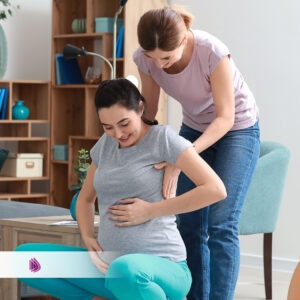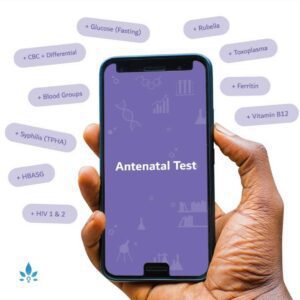I am Pregnant, Should I be Worried About the Recent COVID-19 Outbreak?


Whilst being pregnant can be a time of eager anticipation and excitement, it can also be a time of increased anxiety and worry. Certainly, in the months leading up to delivery there is a lot to consider, from keeping yourself and your developing baby fit and healthy, to all the practical aspects that come with welcoming a newborn into your home. Needless to say, a global health pandemic, such as the coronavirus 2019 (COVID-19) outbreak, is probably the last thing in the world you want to have to consider right now.
So, how worried should you be? Does being pregnant make you more likely to catch COVID-19, or more susceptible to developing serious complications? What are the risks to your unborn baby? What should you do if you develop symptoms of COVID-19 whilst pregnant?
Am I more likely to catch COVID-19?
The short answer to this, and in fact to many of the questions involving pregnancy and COVID-19, is that we simply do not know. Consider that this is a virus that has only been in existence since the very end of 2019; whilst the number of reported cases has grown exponentially over a remarkably short time; there is still not enough data available from existing cases to enable researchers to perform detailed risk analyses.
At the moment, what we do know is that with the rapid, progressive spread of COVID-19 globally, pregnant women are, and will continue to be, affected. Pregnancy can alter the body’s immune system and consequently the way in which it responds to viral infections. This means that pregnant women occasionally experience more severe symptoms. However, guidelines released by the UK-based Royal College of Obstetricians and Gynaecologists (RCOG), state that pregnant women are no more likely to contract COVID-19 than the general public.
Will my symptoms be more serious if I am pregnant?
The RCOG states that the majority of pregnant women who develop COVID-19 will experience mild or moderate cold or flu symptoms. They suggest that most pregnant women will not become severely unwell. Furthermore, the World Health Organisation (WHO) does not mention pregnant women as a high risk group:
“……evidence to date suggests that two groups of people are at a higher risk of getting severe COVID-19 disease. These are older people; and those with underlying medical conditions”.
WHO Situation Report 51, 11th March 2020.
Despite this, on 16th March 2020, pregnant women in the UK were placed in the category of ‘vulnerable people’, meaning that they should adopt stringent social distancing practices to reduce their risk of infection. There is no data from the current outbreak, but other related coronavirus infections, such as severe acute respiratory syndrome (SARS-CoV) and Middle East respiratory syndrome (MERS-CoV), did cause serious illness in some pregnant women. Adding pregnant women to the category of vulnerable people is a precautionary, preventative step aimed at reducing the risk of severe infection, on the basis of the limited data we have thus far.
It is imperative, therefore, that pregnant women take all necessary steps to avoid infection:
- Wash hands regularly and thoroughly.
- Adopt stringent personal respiratory hygiene approaches. Cover your mouth when you cough or sneeze. Avoid touching your eyes, mouth or nose.
- Avoid coming into contact with those who are unwell, particularly if they have tested positive for COVID-19.
I have been diagnosed with COVID-19, am I more likely to experience complications in my pregnancy?
This is another question that is very difficult to answer with the limited data we currently have available to us. However, data on other viral respiratory illnesses has suggested that pregnant women are at higher risk of obstetric complications, than their non-infected counterparts. Infection with SARS-CoV or MERS-CoV during pregnancy did increase the possibility of complications; for example, SARS has been shown to restrict foetal growth and MERS has been implicated in cases of placental abruption.
There is no evidence that COVID-19 increases the risk of miscarriage, and data on the other coronaviruses has been inconclusive in terms of identifying a direct link. However, COVID-19 might increase your risk of premature delivery. This is evident in the preliminary data to come out of China, but it is not yet clear whether these were induced deliveries, performed to enable better management of the expectant mother’s symptoms.
What are the risks to my unborn child if I develop COVID-19?
Vertical transmission is the name given to an infection that passes from the mother to the child whilst the child is in the womb (in utero). There are very few reported cases of newborns testing positive for COVID-19. A recent case made it into the UK press of a newborn and his mother both testing positive, and there are reports of a similar case in China, earlier on in the outbreak. It is not yet known whether either baby developed the condition in utero, or whether the hospital environment, or exposure to the mother’s coughing at birth, resulted in viral transmission. Regarding the UK case, it is also not known whether the infant went on to develop any COVID-19 symptoms; in general, children appear to experience only mild symptoms.
There have been a limited number of studies looking at mothers who were infected with the virus during the third trimester of pregnancy and went on to deliver healthy, non-infected babies. Naturally, to date, these studies only involve a very small number of cases and further work is definitely required. However, the take home message should be that whilst it is impossible to say that vertical transmission does not happen, the evidence to date suggests it is not inevitable and mothers who have the virus are not guaranteed to pass it on to their child.
The RCOG do not recommend Caesarean section (C-section) as standard for patients with COVID-19; a vaginal birth may still be possible, depending on the severity of the mother’s symptoms. If she is experiencing pronounced respiratory difficulties, a natural birth is likely to exacerbate things and her doctor will probably recommend a C-section. Birthing pools are not recommended for women who have tested positive for COVID-19.
What should I do if I start to develop COVID-19 symptoms during pregnancy?
First and most importantly, don’t panic. You will need to follow the guidelines stipulated by the country you live in. At this moment in time, different countries have different policies and recommendations in place. Maintain contact with your doctor or midwife; provided your pregnancy is otherwise low risk and not at a critical stage, they will probably want to postpone any scheduled antenatal appointments.
As time passes, an increasing number of doctors and midwives are likely to conduct appointments via video conferencing, even for those who do not have any COVID-19 symptoms. This will enable all patients to limit social contact.
If symptoms do become severe, you will likely be hospitalised and placed in isolation. Your baby will be closely monitored and a multidisciplinary team of specialists will construct an individualised management strategy, to ensure the best outcome for you and your baby.
Final note
These are unusual times and we still have much to learn and discover about COVID-19. Even the most simple questions cannot yet be definitively answered and rumours and speculation are rife. We have used the most trusted sources and evidence to bring you this information and will commit to updating regularly, as our knowledge and understanding grows.
At Nabta Health, we will present the facts as they stand today; we can attempt to offer reassurance and will stress the importance of continuing to look after not only your physical health, but also your mental health.
Take care.
Nabta is reshaping women’s healthcare. We support women with their personal health journeys, from everyday wellbeing to the uniquely female experiences of fertility, pregnancy, and menopause.
Get in touch if you have any questions about this article or any aspect of women’s health. We’re here for you.
Sources:
- Chen, Yan, et al. “Infants Born to Mothers With a New Coronavirus (COVID-19).” Frontiers in Pediatrics, vol. 8, 16 Mar. 2020, doi:10.3389/fped.2020.00104.
- “COVID-19 Virus Infection and Pregnancy.” Royal College of Obstetricians & Gynaecologists, www.rcog.org.uk/en/guidelines-research-services/guidelines/coronavirus-pregnancy/covid-19-virus-infection-and-pregnancy/. Based on: https://www.rcog.org.uk/globalassets/documents/guidelines/2020-03-21-covid19-pregnancy-guidance-2118.pdf.
- Favre, Guillaume, et al. “2019-NCoV Epidemic: What about Pregnancies?” The Lancet, vol. 395, no. 10224, 22 Feb. 2020, doi:10.1016/s0140-6736(20)30311-1.
- Mullins, E., et al. “Coronavirus in Pregnancy and Delivery: Rapid Review.” Ultrasound in Obstetrics & Gynecology, 2020, doi:10.1002/uog.22014.
- “Novel Coronavirus (2019-NCoV) Situation Reports.” World Health Organization, World Health Organization, www.who.int/emergencies/diseases/novel-coronavirus-2019/situation-reports/.
- “Pregnancy & Breastfeeding.” Centers for Disease Control and Prevention, Centers for Disease Control and Prevention, 14 Mar. 2020, www.cdc.gov/coronavirus/2019-ncov/prepare/pregnancy-breastfeeding.html?CDC_AA_refVal=https://www.cdc.gov/coronavirus/2019-ncov/specific-groups/pregnancy-faq.html.
- Rasmussen, Sonja A., et al. “Coronavirus Disease 2019 (COVID-19) and Pregnancy: What Obstetricians Need to Know.” American Journal of Obstetrics and Gynecology, 24 Feb. 2020, doi:10.1016/j.ajog.2020.02.017.
- Schwartz, David A., and Ashley L. Graham. “Potential Maternal and Infant Outcomes from Coronavirus 2019-NCoV (SARS-CoV-2) Infecting Pregnant Women: Lessons from SARS, MERS, and Other Human Coronavirus Infections.” Viruses, vol. 12, no. 2, 10 Feb. 2020, p. 194., doi:10.3390/v12020194.
- Wang, Xiaotong, et al. “A Case of 2019 Novel Coronavirus in a Pregnant Woman with Preterm Delivery.” Clinical Infectious Diseases, 28 Feb. 2020, doi:10.1093/cid/ciaa200.













































